
Thursday, November 30, 2006
Sound Moving Beyond Language
Ben uses sound to not just communicate but also to see. Think dolphins and bats.
DealBreaker's John Carney has suggested that given the theory that the earliest languages were click-based, perhaps it is possible that our vocal cords developed out of a need to not just communicate but also to see in the dark. If this were true then Ben's ability to echolocate may not be a new adaptation but rather the reawakening of a long-dormant trait.
DealBreaker's John Carney has suggested that given the theory that the earliest languages were click-based, perhaps it is possible that our vocal cords developed out of a need to not just communicate but also to see in the dark. If this were true then Ben's ability to echolocate may not be a new adaptation but rather the reawakening of a long-dormant trait.
Labels: Carney
The Daily Hump: Chipmunk
 The chipmunk is a fairly common squirrel-like rodent that inhabitats the woodlands and backyards of North America and northeastern Asia dining on grain, nuts, birds' eggs, fungi, worms, and insects. Yum. As Wikipedia reports,
The chipmunk is a fairly common squirrel-like rodent that inhabitats the woodlands and backyards of North America and northeastern Asia dining on grain, nuts, birds' eggs, fungi, worms, and insects. Yum. As Wikipedia reports, The name [chipmunk] may have originally been spelled "chitmunk" (from the Odawa word jidmoonh, meaning "red squirrel")...However, the earliest form cited in the Oxford English Dictionary (from 1842) is "chipmonk". Other early forms include "chipmuck" and "chipminck", and in the 1830s they were also referred to as "chip squirrels", possibly in reference to the sound they make.The Odawa (also spelled Ottawa) are a First Nations tribe that lived along the northern shores of Lake Huron (they're now scattered around Michigan, Ontario and, unexpectedly, Oklahoma) whose language belongs to the Ojibwa family. The word jidmoonh (also sometimes written as ajidmoonh) literally translates to "one who descends trees headlong", which you'll know is pretty poignant if you've spent any time observing these creatures (guilty).
It's also been assumed that the name chipmunk was influenced by the English words chip and mink (humorously described by a quote in the Online Etymology Dictionary as "a stinking animal in Finland").
Chipmunks [CuteOverload]
Labels: Odawa, Ojibwa, The Daily Hump
Wednesday, November 29, 2006
The Daily Hump: Elysium
 In Monday's post I mentioned the asphodel, a flower which is said to bloom in abundance across the pastures of Elysium. The Elysium fields were a sort of Greek Valhalla, serving as an abode for dead heroes and similarly blessed folks. Figuratively, Elysium can be used to describe any place or state of ideal happiness (yet despite its namesake the Champs-Élysées always struck me as rather hellish).
In Monday's post I mentioned the asphodel, a flower which is said to bloom in abundance across the pastures of Elysium. The Elysium fields were a sort of Greek Valhalla, serving as an abode for dead heroes and similarly blessed folks. Figuratively, Elysium can be used to describe any place or state of ideal happiness (yet despite its namesake the Champs-Élysées always struck me as rather hellish).The etymology of Elysium is up for debate (as Wikipedia notes the spelling Elysium is a Latinization of the Greek word Elysion). Depending on who you talk to it's either:
1) "...[A] mysterious name that evolved from a designation of a place or person struck by lightning, enelysion, enelysios."
2) "...[Elysion] may...derive from the Egyptian term ialu (older iaru), meaning "reeds," with specific reference to the "Reed fields" (Egyptian: sekhet iaru / ialu), a paradisiacal land of plenty where the dead hoped to spend eternity."
3) "Biblical scholars have suggested that Elysion may derive from Elisha, who was, according to Genesis, a son of Yawan (Iouan, forefather of the Ionians) and one of the ancestors of the Greeks. Elisha may be worshipped as a god by his earliest descendents."
 IMHO, Theory #2 is rather dull. And although I immensely appreciate and admire the fact that the Greeks had a term for people or places struck by lightning (why don't we do that?) it's Theory #3 that I like the most. Why? Simple...Elisha. Not to be confused with Another Bad Creation's pop hit "Ayesha", Elisha was a bald-headed Hebrew prophet with a temper problem. After 42 children mocked Elisha's receding hairline he summoned two she-bears from the woods who proceeded to maul the kids to pieces (II Kings 2:23-24). Awesome!
IMHO, Theory #2 is rather dull. And although I immensely appreciate and admire the fact that the Greeks had a term for people or places struck by lightning (why don't we do that?) it's Theory #3 that I like the most. Why? Simple...Elisha. Not to be confused with Another Bad Creation's pop hit "Ayesha", Elisha was a bald-headed Hebrew prophet with a temper problem. After 42 children mocked Elisha's receding hairline he summoned two she-bears from the woods who proceeded to maul the kids to pieces (II Kings 2:23-24). Awesome!Elysium [Wikipedia]
Labels: Egyptian, Greek, Hebrew, The Daily Hump
Tuesday, November 28, 2006
The Daily Hump: Mulberries
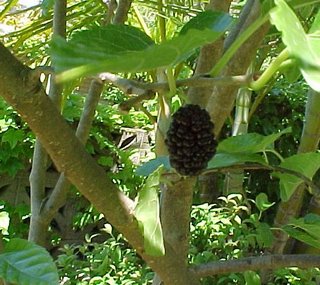 Most children first encounter the concept of a mulberry bush at a very early age. It's the place where monkeys chase weasels while dogs laugh in amusement until suddenly, rather inexplicably, the weasel "pops". (The cryptic nursery rhyme, which date back to 17th c England, apparently confounds many people.) The "mulberry bush" is actually not a bush at all, but rather a tree native to the warmer climates of Asia, Africa and North America. It's also economically valuable as the leaves are the sole food source for silkworms.
Most children first encounter the concept of a mulberry bush at a very early age. It's the place where monkeys chase weasels while dogs laugh in amusement until suddenly, rather inexplicably, the weasel "pops". (The cryptic nursery rhyme, which date back to 17th c England, apparently confounds many people.) The "mulberry bush" is actually not a bush at all, but rather a tree native to the warmer climates of Asia, Africa and North America. It's also economically valuable as the leaves are the sole food source for silkworms.The word mulberry can obviously be broken in to two components. Analyzing the second element first, -berry comes from the Germanic languages, thus we find berie in Old English. This, in turn, is believe to come from the Old Teutonic *basjôn-, *bazjôn-. As the OED notes
The ulterior history is uncertain: *bazjo- has been conjecturally referred to *bazo-z [meaning "bare"] (q.v.), as if a bare or uncovered fruit, also to the root represented by [Sanskrit] bhas-, [meaning] "to eat".To understand the first element, mul-, it's best if we look at the mulberrie's genus, Morus, which comes from the Latin word for the mulberry, morum. The plural of the Latin morum is mora, and in post-classical Latin (4th c.) this form became the feminine singular. By the 12th c. mora became more became moure and then the Old French mur. Finally, mur became mul and mulberry makes its first recognizable appearance in English in Wycliffe's Bible of 1382 ("cedres as longe mulberies").
If you're curious about that mur to mul transformation, R and L are very similar phonetically (both are alveolar consonants) and it's not surprising that one would transform into the other. To give you an idea of the letters' similarities
...in Korean, there is a phoneme /r/ that is a flapped r between vowels, and is an l-sound in other phonetic contexts. These sounds are very different to an English speaker, who is attuned to hearing them because the differences are meaningful in English. However, the native Korean speaker has learned from an early age to consider the two sounds the same. Thus, Korean speakers do not differentiate the two words "ram" and "lamb", despite the fact that both R and L sounds occur in the language.Phonemes [Wikipedia]
Labels: Korean, Latin, Old English, Old French, Proto-Germanic, Sanskrit, The Daily Hump
Monday, November 27, 2006
The Daily Hump: Daffodil
 The common daffodil, also known as a narcissus (which has an interesting etymology of its own), is a hardy bulb that flowers mainly in the spring. In Middle English the flower was known as affodil, coming from the Latin asphodelus, meaning "asphodel", which is basically another name for daffodils and some other plants in the lily family.* The flower first made its appearance (as affodill) in the English language around 1420.
The common daffodil, also known as a narcissus (which has an interesting etymology of its own), is a hardy bulb that flowers mainly in the spring. In Middle English the flower was known as affodil, coming from the Latin asphodelus, meaning "asphodel", which is basically another name for daffodils and some other plants in the lily family.* The flower first made its appearance (as affodill) in the English language around 1420.The mystery is, of course, how we got from the Middle English affodil to the Modern English daffodil. Where did that d come from? The OED has a number of theories:
It has been variously suggested as due to childish or playful distortion, as in Ted for Edward, tante for aunt; to union of the article th' (cf. COTGR., Affrodille, Th'Affodill, and north. Eng. t'affadil); to final d of and, in (e.g.) ‘fennell an-d affodil’; to union of the Dutch or Flemish article, as de affodil = the affodil; and to Fr. prep. d' as in fleur d'aphrodille...*Asphodel is also the flower that blooms along the plains of Hades. It was a favorite food of the dead and it takes little imagination to imagine toga-wearing zombies grazing on the asphodel pastures of the Elysium fields:
down the dank(Odyssey 24.5-9, translation by Robert Fagles)
moldering paths and past the Ocean's streams they went
and past the White Rock and the Sun's Western Gates and past
the Land of Dreams, and soon they reached the fields of asphodel
where the dead, the burnt-out wraiths of mortals make their home
Labels: Dutch, Flemish, Latin, Middle English, The Daily Hump
Wednesday, November 22, 2006
The Daily Hump: A Humorous Perversion
 Today's hump is neither humorous nor perverse. You've been had. This morning we're looking at gallivant, which the OED describes as a "humorous perversion" (ah!) of gallant (noting that gallivant is generally used in its present participle form gallivanting). Gallant isn't just a ugly old-folks car. Back in the early 19th c., around the same time gallivant first appeared in print (1823), gallant was being used to mean "to gad about idly". Interestingly the OED defines gallivant as "To gad about in a showy fashion, esp. with persons of the other sex." What's with gad?
Today's hump is neither humorous nor perverse. You've been had. This morning we're looking at gallivant, which the OED describes as a "humorous perversion" (ah!) of gallant (noting that gallivant is generally used in its present participle form gallivanting). Gallant isn't just a ugly old-folks car. Back in the early 19th c., around the same time gallivant first appeared in print (1823), gallant was being used to mean "to gad about idly". Interestingly the OED defines gallivant as "To gad about in a showy fashion, esp. with persons of the other sex." What's with gad?Gad (in verb form) is of obscure origin. Although it's possible the word comes from the same root as the noun form (i.e. gadfly, where the sense of gad refers to a goad used for prodding cattle), the OED notes that its usage quotes don't support this thesis. Rather, they theorize that gad is "a back-formation" of gadling, which during the 16th c. meant a wayfarer or vagabond. The original sense of gadling, as it was used in Beowulf ("His gædelinges guðgewædu"), meant "companion" or "fellow" and it comes from the Old English root gæd meaning "fellowship". Incidentally, this is the same root which gives us our modern verb to gather.
The verb gallant is from the adjective form and is of French origin. The OED notes
The early senses of the adj. in Fr. are: ‘dashing, spirited, bold’ (obsolete in Fr., but the source of the prevailing sense in mod.Eng.); ‘gay in appearance, handsome, gaily attired’; and ‘fitted for the pleasures of society, attractive in manners, courteous, polished’. The last of these gave rise in mod.Fr. to the specialized senses ‘politely attentive to women’, and ‘amorous, amatory’, which were adopted into Eng. in the 17th c., and are usually distinguished by the accentuation ga'llant.The Old French root, galant, is from the past participle form of the Old French verb galer, meaning "to make merry". Via a Spanish lineage this is where Modern English gets its word gala.
WordHumper returns on Monday. Gobble gobble.
Labels: French, Old English, Old French, Spanish, The Daily Hump
Tuesday, November 21, 2006
The Daily Hump: Corduroy
 Corduroy is from the French corde du roi, "the king's cord." If it were only that easy. Depending on which source you want to believe corde du roi may be a great example of a false etymology.
Corduroy is from the French corde du roi, "the king's cord." If it were only that easy. Depending on which source you want to believe corde du roi may be a great example of a false etymology. The word corduroy has never been used in French; they refer to the fabric as velours côtelé. The AHD reports that corduroy comes from cord + duroy, duroy being an obsolete term referring to a course woolen fabric. However, the OED disputes this:
Duroy occurs with serge and drugget as a coarse woollen fabric manufactured in Somersetshire in the 18th c....it has no apparent connexion with corduroy.Alas, the OED doesn't offer much of an alternative theory feebly noting that Corderoy is an English surname. Interestingly, the OED states that although the etymology of duroy is uncertain it could be from du roi, "of the king". Thus, if we accept AHD's contention that the etymology of corduroy is cord + duroy, then the supposedly false etymology, "the king's cord", may actually be correct!
Labels: French, The Daily Hump
Monday, November 20, 2006
The Daily Hump: Farce
NPR reports this morning that some watchdog groups are criticizing the Saddam Hussein trial as a farce. This usage mirrors OED's n.2 definition:
And just in time for Thanksgiving, there still exists a verb form which retains the original Latin sense and means "to stuff", as for roasting. The noun farce can also means "stuffing". And you may have heard the word forcemeat, which is finely ground, spiced meat that is generally used as stuffing. The first element, force-, comes from the same Latin root as farce.
Something as ridiculous as a theatrical farce; a proceeding that is ludicrously futile or insincere; a hollow pretence, a mockery.The word originally comes to us from the Latin farcīre, meaning "to stuff". In the 13th c. the latinized farsa, farsia was used in both English and French to refer to words and phrases used to "pad out" interludes or interpolations in liturgical texts. Shortly thereafter, the Old French farce evolved to mean "interludes of impromptu buffoonery" which were ad-libbed by actors in religious dramas. The transition to the modern sense is thus obvious.
And just in time for Thanksgiving, there still exists a verb form which retains the original Latin sense and means "to stuff", as for roasting. The noun farce can also means "stuffing". And you may have heard the word forcemeat, which is finely ground, spiced meat that is generally used as stuffing. The first element, force-, comes from the same Latin root as farce.
Labels: Latin, Old French, The Daily Hump
Friday, November 17, 2006
Hump This: Cat

Hump This is a (quasi-)weekly Friday feature where you, the WordHumper reader, choose which lucky word gets humped back to the stoneage (or at least to Proto-Indo-Europa). Today's word comes from RM in California who asks:
You already humped goat but what about cat? I think it must come from [the French] chat but where'd THAT come from? Not Latin, clearly.It's a simple enough word and probably one of the first words most people learn to spell. The OED reports cat is traced as far back as records go for all modern European languages suggesting "extensive communication". Alas, it is because cat can be found in virtually all these languages over the past 2,000 years (the first recorded appearance of the word in Europe is the Latin catta, 1st c. CE) that it becomes practically impossible to pinpoint the word's origin.
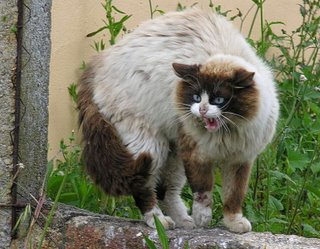 That being said, cats have been kept by humans since ancient Egyptian times and most likely our modern word cat comes from this region (cf. Nubian kadis, Berber kadiska, both meaning "cat").
That being said, cats have been kept by humans since ancient Egyptian times and most likely our modern word cat comes from this region (cf. Nubian kadis, Berber kadiska, both meaning "cat").If you have a word you'd like humped please email it, along with your location, to wordhumper.
cat [Online Etymology Dictionay]
Thursday, November 16, 2006
The Daily Hump: Dandelion
 I owned an album when I was very young, "Dandelions Never Roar"; even to a 3-year-old the title's pun was plainly obvious. But it wasn't until 25 years later that I wondered whether this common flower really had a feline namesake or whether the similarities in name were purely coincidental.
I owned an album when I was very young, "Dandelions Never Roar"; even to a 3-year-old the title's pun was plainly obvious. But it wasn't until 25 years later that I wondered whether this common flower really had a feline namesake or whether the similarities in name were purely coincidental.I'm now able to report that this is not a coincidence. Speakers of Middle English called the dandelion dent-de-lioun. From here it's pretty easy to see the Old French (dent-de-lion) influence and translate the root; "tooth of lion". This description of course refers to the flower's sharply indented leaves. As the AHD reports,
The English spelling reflects the pronunciation of the Old French word at the time it was borrowed into English. The t in dentdelion probably disappeared early in Old French, having been absorbed into the related sound of the d. The earliest recorded instance of the word occurs in an herbal written in 1373, but we find an instance of dandelion used in a proper name (Willelmus Dawndelyon) in a document dated 1363.
 It's interesting to note that in Modern French the name for the flower has absolutely nothing to do with lions or teeth; the word is pissenlit, which amusingly translates to "urinate in bed". As Wikipedia states this likely refers to the flower's well-known diuretic properties. The dandelion's herbal properties are also what gives it its genus, Taraxacum. Botanical.com says that
It's interesting to note that in Modern French the name for the flower has absolutely nothing to do with lions or teeth; the word is pissenlit, which amusingly translates to "urinate in bed". As Wikipedia states this likely refers to the flower's well-known diuretic properties. The dandelion's herbal properties are also what gives it its genus, Taraxacum. Botanical.com says that Taraxacum...is derived from the Greek taraxos (disorder), and akos (remedy), on account of the curative action of the plant. A possible alternative derivation of Taraxacum is suggested in The Treasury of Botany:In any event, next time you travel to Paris, drink too much wine and piss your sheets, just claim it was the dandelion.The generic name is possibly derived from the Greek taraxo ("I have excited" or "caused") and achos (pain), in allusion to the medicinal effects of the plant.
Labels: Middle English, Old French, The Daily Hump
Wednesday, November 15, 2006
The Daily Hump: Quagmire
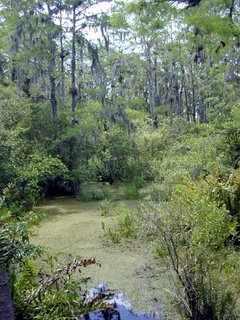 We hear it daily: "Kharrazi warns UK over Iraq quagmire", "Bush Vietnam trip revives Iraq quagmire", "The quagmire deepens in Afghanistan". In fact, just this morning Google News displays about 300 articles published in the past 24 hours that use the word quagmire. Outside the realm of warfare quagmire is of course a fairly well-known word referring to a swamp or bog. The word is a compound of 2 elements; quag + mire.
We hear it daily: "Kharrazi warns UK over Iraq quagmire", "Bush Vietnam trip revives Iraq quagmire", "The quagmire deepens in Afghanistan". In fact, just this morning Google News displays about 300 articles published in the past 24 hours that use the word quagmire. Outside the realm of warfare quagmire is of course a fairly well-known word referring to a swamp or bog. The word is a compound of 2 elements; quag + mire.Let's start with the second element first, -mire. To be mired down in something is to be in a situation where it is difficult to extricate oneself. Similarly, we use the phrase bogged down, or to be swamped. Mire comes from the Old Norse mýrr which predictably means bog. The OED goes on to explain the mire is a variant of the Germanic base of mese, which is an obsolete regional word from England's southwest meaning moss. Mese is "an ablaut variant of the Germanic base" of moss, thus mire and moss are related.
 Now let's go back to t he first element, quag-. Like mire, quag can also stand on its own, meaning, according to the AHD, quagmire. The OED's definition is a bit more telling:
Now let's go back to t he first element, quag-. Like mire, quag can also stand on its own, meaning, according to the AHD, quagmire. The OED's definition is a bit more telling: A marshy or boggy spot, esp. one covered with a layer of turf which shakes or yields when walked on.That "turf which shakes" is quaking (as in an earthquake). In fact, quag and quake come from the same Old English root cwacian (incidentally, there is a synonymous and obsolete variant of quagmire, quakemire). The related Old English word *cwabba meaning "to shake or tremble" is onomatopoeic and comes from the sound of something soft and flabby being jiggled. Thus, the quag'iness of a quagmire is distantly related to the sound it makes as one walks through its muck.
Labels: Old English, Old Norse, Proto-Germanic, The Daily Hump
Tuesday, November 14, 2006
The Word of the Year should be fixed
 The Oxford University Press named it's Word of the Year yesterday, carbon neutral, which is defined as follows:
The Oxford University Press named it's Word of the Year yesterday, carbon neutral, which is defined as follows: Being carbon neutral involves calculating your total climate-damaging carbon emissions, reducing them where possible, and then balancing your remaining emissions, often by purchasing a carbon offset: paying to plant new trees or investing in “green” technologies such as solar and wind power.Eric McKean, editor in chief of the New Oxford American Dictionary 2e, says
All the Oxford lexicographers look forward to choosing the Word of the Year. We know that people love fun, flashy words like truthiness or the latest Bushism, but we are always looking for a word that is both reflective of the events and concerns of the past year and also forward-looking: a word that we think will only become more used and more useful as time goes on.Well, at least McKean admits that carbon neutral is neither fun nor flashy. Given the list of runner-ups I definitely would have voted for ghostriding. Although, I'm not sure why this is considered a new word; I have clear memories of ghostriding being in use during my childhood (mid 80's). It referred to the act of jumping off one's bike while it careened into a tree.
Last year's Word of the Year, podcasting, although banal, is at least ubiquitous and thus an argument can be made for inclusion. But carbon neutral? That's just claptrap.
Monday, November 13, 2006
Spade and Neutered: A Treatise in Ignorance
 There's a kerfuffle brewing over DealBreaker.com. In a post from November 13, Bess "Jewess" Levin reviewed some contestants vying for an internship at Morgan Stanley (the details aren't important). One hopeful, who happens to be black, was described thusly:
There's a kerfuffle brewing over DealBreaker.com. In a post from November 13, Bess "Jewess" Levin reviewed some contestants vying for an internship at Morgan Stanley (the details aren't important). One hopeful, who happens to be black, was described thusly: Uncomfortably charismatic. You know the type—little too smooth for their own good. But the kid quotes Michael Jackson and let’s call a spade a spade—Morgan Stanley could use a little Michael Jackson in its life.Well, run for the hills, Ma Barker! Looks like DealBreaker has a little Eichmann in its midst. Wait, you didn't catch the blatantly racial epithet? Good thing we have commenters:
"call a spade a spade"? *cough*Go back to Brown people! Let's forget for a moment that Bess has used the phrase before on DealBreaker, and with no racist undertone. Although I hate to be the pooper at a hate-crime party, I busted out with some etymology in an attempt to curtail the all-Bess pile-on:
The ethnic slur that Levin inserted into her comments on Cameron has not gone unnoticed.
"let's call a spade a spade"???? about the only african-american in the piece???? you have GOT to be kidding!
Are you serious? That Levin wasn't aware of the implications of her ethnic slur is beyond belief.
Per the Online Etymology Dictionary:My attempt failed. A commenter replied to me with this gem:
To call a spade a spade 'use blunt language' (1542) translates a Gk. proverb (known to the Romans), but Erasmus mistook Gk. skaphe 'trough, bowl' for a derivative of the stem of skaptein 'to dig,' and the mistake has stuck. The original, then, is 'to call a bowl a bowl.'
The origins of the word are pretty much irrelevant. It's how they are used that matters.With this argument I can call anyone anything and can be considered offensive simply by how the word is used in a sentence (e.g. You're a chair. Why do you have to be such a buckyball? When did you become a cup of tea?). Someone should have warned David Howard. The comments get even better:
...it's absurd to presume that Levin was totally unaware of the alternative, and much more common, meaning of the word "spade" when she used it...As publisher Elizabeth Spiers observes,
That may be the "much more common" usage where you are...but Amherst (Bess's alma mater) and liberal well-educated Silicon Alley are not exactly known for their pockets of seething bigotry. I haven't heard it used that way since i moved out of Alabama...
 And if you agree with the commenter just do a Google search for spade--I found shovels, playing cards, Sam Spade, Jack Spade, Kate Spade, "Single Page Application and Development Environment", and way too much David Spade. But in the 10 pages of results I examined I only found spade used offensively when I actually clicked through into dictionary definitions.
And if you agree with the commenter just do a Google search for spade--I found shovels, playing cards, Sam Spade, Jack Spade, Kate Spade, "Single Page Application and Development Environment", and way too much David Spade. But in the 10 pages of results I examined I only found spade used offensively when I actually clicked through into dictionary definitions. Randomhouse.com advises
If the expression is assumed to be offensive, it should be used with caution even if there's no real basis for the assumption.That's poppycock. If a person is offended because of their own ignorance the speaker has absolutely no obligation to apologize. It's hyper-sensitive paranoia, blatant ignorance and political correctness run amok which gives right-wing loonies like Ann Coulter and Rush Limbaugh ammo to say the left are the crazy ones. Stop the insanity!
Labels: Greek
The Daily Hump: Scrimshaw
I'm back! The past two weeks have been exceptionally busy for the WordHumper (the person, not the site). But, the bulk of this work is now behind me and I'm ready to once again take my seat at the Wordhumping helm. So without further ado...
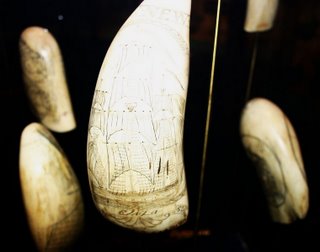 Scrimshaw is a type of art practiced by sailors to pass the time during long voyages at sea. It's the art of carving intricate designs onto whale bones, whale ivories, seashells, etc... using walrus tusks, whale teeth or anything else sailors can find. Michael Quinion reports
Scrimshaw is a type of art practiced by sailors to pass the time during long voyages at sea. It's the art of carving intricate designs onto whale bones, whale ivories, seashells, etc... using walrus tusks, whale teeth or anything else sailors can find. Michael Quinion reports
Here's my theory: When one scrimshaws they're carving with a sharp point. Is it then possible that scrim- reflects the tool of the scrimshaw artisan--that sword-like tip of the walrus tooth that's used to create the intricate designs? -shaw is a bit more difficult to understand, but given that scrimshaw went through so many variations (see Michael Quinion's quote above) where only the scrim- portion remained constant then it appears that -shaw is not critical to the meaning of scrimshaw. Rather, it could be that the -shaw ending was ultimately employed simply because Scrimshaw is an English surname in relatively common usage; that is, scrimshaw came to mean carving with a sharp point (the scrim) via some sort of slang process (similar to the slang substitutions we see in Cockney rhyming slang, where the substituting word has no literal relationship to the original word it's replacing.). Just an idea...
 Scrimshaw is a type of art practiced by sailors to pass the time during long voyages at sea. It's the art of carving intricate designs onto whale bones, whale ivories, seashells, etc... using walrus tusks, whale teeth or anything else sailors can find. Michael Quinion reports
Scrimshaw is a type of art practiced by sailors to pass the time during long voyages at sea. It's the art of carving intricate designs onto whale bones, whale ivories, seashells, etc... using walrus tusks, whale teeth or anything else sailors can find. Michael Quinion reports The origin of the word is almost totally mysterious; it was first recorded about 1825, but its spelling in the first half of the nineteenth century was variable, with forms such as scrimshonting, scrimshonging, scrimshandy, scrimshanking and skrimshander all appearing at various times. There’s some suggestion that our modern spelling was influenced by the proper name Scrimshaw, but nobody seems to know quite why. Since a person who did this on board ship wasn’t working, it may be that the British English scrimshank, to shirk one’s duty, came from the same source.According to the Online Etymology Dictionary the English surname Scrimshaw is attested to as far back as 1154 and comes from the Old French escremisseor, "fencing-master" (that's fencing as in swords, not chain-links). In the OED we find the early 17th c. word scrimer, defined as "fencer", which is a variation of escrimer, or "swordsman". The modern sports term scrimmage come from this French root, as does skirmish.
Here's my theory: When one scrimshaws they're carving with a sharp point. Is it then possible that scrim- reflects the tool of the scrimshaw artisan--that sword-like tip of the walrus tooth that's used to create the intricate designs? -shaw is a bit more difficult to understand, but given that scrimshaw went through so many variations (see Michael Quinion's quote above) where only the scrim- portion remained constant then it appears that -shaw is not critical to the meaning of scrimshaw. Rather, it could be that the -shaw ending was ultimately employed simply because Scrimshaw is an English surname in relatively common usage; that is, scrimshaw came to mean carving with a sharp point (the scrim) via some sort of slang process (similar to the slang substitutions we see in Cockney rhyming slang, where the substituting word has no literal relationship to the original word it's replacing.). Just an idea...
Labels: Old French, The Daily Hump
Wednesday, November 08, 2006
The Daily Hump: Sea Change
 Ah, sweet Election Day hangover--as The Union Leader of New Hampshire notes "Dems surge in sea change for House". Radio Iowa reports a "Sea-change in Iowa's congressional delegation". Hillary Clinton urges a "sea change" in Mideast policy. We must thank Shakespeare for the phrase sea change, which first makes an appearance in The Tempest. As Ariel, the spirit of the air, sings
Ah, sweet Election Day hangover--as The Union Leader of New Hampshire notes "Dems surge in sea change for House". Radio Iowa reports a "Sea-change in Iowa's congressional delegation". Hillary Clinton urges a "sea change" in Mideast policy. We must thank Shakespeare for the phrase sea change, which first makes an appearance in The Tempest. As Ariel, the spirit of the air, sings Full fathom five thy father lies:Michael Quinion notes
Of his bones are coral made:
Those are pearls that were his eyes:
Nothing of him that doth fade
But doth suffer a sea-change
Into something rich and strange.
Shakespeare obviously meant that the transformation of the body of Ferdinand’s father was made by the sea, but we have come to refer to a sea change as being a profound transformation caused by any agency. So pundits and commentators who think it has something to do with the ebb and flow of the tide, and use it for a minor or recurrent shift in policy or opinion, are doing a grave injustice to one of the most evocative phrases in the language.A grave injustice, indeed! A quick search on Technorati shows 74 blogs using the phrase "sea change" in the past 24 hours, about 24 of these also mentioning the word "Democrats". On Google News we find 37 articles published in the past 24 hours that use "sea change" and 12 of those mention the word "Democrats". Thus, in both cases about 33% of online sources appear to be using the phrase sea change in reference to a shifting political tide.
Michael Quinion reports that the earliest idiomatic use of sea change seems to be from 1877; the OED says the first allusive use was from a 1917 Ezra Pound poem. In both cases sea change was used apolitically. At the earliest, it seems sea change wasn't used in reference to politics until after WWI.
Labels: Shakespeare, The Daily Hump
Monday, November 06, 2006
The Daily Hump: Highfalutin
 For your Monday morning enjoyment I give you highfalutin, a purely American word with an unknown etymology and, I imagine, most often muttered by Yosemite Sam-like characters. The word, meaning pompous or pretentious, has been around since the 19th c, first appearing in 1839. The OED theorizes that -falutin is "a whimsical pronunciation of fluting, or a grandiose equivalent of flying or flown. The AHD offers this morsel of info:
For your Monday morning enjoyment I give you highfalutin, a purely American word with an unknown etymology and, I imagine, most often muttered by Yosemite Sam-like characters. The word, meaning pompous or pretentious, has been around since the 19th c, first appearing in 1839. The OED theorizes that -falutin is "a whimsical pronunciation of fluting, or a grandiose equivalent of flying or flown. The AHD offers this morsel of info: H.L. Mencken, in his famous book The American Language, mentions highfalutin as an example of the many native U.S. words coined during the 19th-century period of vigorous growth. Although highfalutin is characteristic of American folk speech, it is not a true regionalism because it has always occurred in all regions of the country, with its use and popularity spurred by its appearance in print. The origin of highfalutin, like that of many folk expressions, is obscure. It has been suggested that the second element, –falutin, comes from the verb flute—hence high-fluting, a comical indictment of people who think too highly of themselves.My suspicion is -falutin is a corruption of flaunt. Pompous and pretentious people flaunt themselves; the AHD even defines pretentious as "Making or marked by an extravagant outward show; ostentatious. See synonyms at showy"--showy and ostentatious are certainly similar to flaunt in meaning. We know the word flaunt was in use in America during the years when highfalutin first appeared; Washington Irving used the word in 1821's Sketch Book ("The Miss Lambs might now be seen flaunting along the street in French bonnets." [OED]). The etymology of flaunt, like highfalutin, is unknown; however, the OED suggests that "Possibly the word [flaunt] may be an onomatopoeia formed with a vague recollection of fly, flout". Thus, regardless of the theories outlined above, it's possible all roads ultimately lead to flute.
highfalutin [AHD]
pretentious [AHD]
Labels: The Daily Hump
Friday, November 03, 2006
The Daily Hump: Go puck yourself

If you've been keeping up with the site this week you'll know that bogeyman and bugaboo share a common root, the Welsh word bwg, meaning "ghost" (see also bugbear). Related to bwg is the Welsh pwca, best described as a fiend or ghoul.
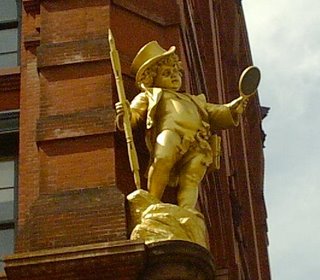 From pwca we get the English word puck. Pucks were a class of pre-Christian nature spirits common in popular English superstition. It was during the 16th c. that a puck became the Puck (note capital P), identified alternately with the devil or a trickster-like sprite. By the time Shakespeare authored A Midsummer Night's Dream in the mid-1590s the identities of Puck and Robin Goodfellow (first cited in 1531 per OED) were so indistinguishable from one another as to render their names interchangeable.
From pwca we get the English word puck. Pucks were a class of pre-Christian nature spirits common in popular English superstition. It was during the 16th c. that a puck became the Puck (note capital P), identified alternately with the devil or a trickster-like sprite. By the time Shakespeare authored A Midsummer Night's Dream in the mid-1590s the identities of Puck and Robin Goodfellow (first cited in 1531 per OED) were so indistinguishable from one another as to render their names interchangeable.Fairy: Either I mistake your shape and making quite,Interestingly, these lines also reveal a third name, Hobgoblin. In their common noun form hobgoblins*, like pucks, are mischievous imps. The prefix hob- was a familiar by-form of the name Rob. It's not surprising, since the word hobgoblin likely came from Robin Goblin, which of course is a reference to Robin Goodfellow.
Or else you are that shrewd and knavish sprite
Called Robin Goodfellow...
Those that Hob-goblin call you, and sweet Puck,
You do their work, and they shall have good luck.
*For more on goblins see my gremlin post
William Shakespeare's A Midsummer Night's Dream [U of Oregon]
Robin Goodfellow [Wikipedia]
Hobgoblin [Wikipedia]
Puck [Wikipedia]
Labels: Shakespeare, The Daily Hump, Welsh Gaelic
Thursday, November 02, 2006
The Daily Hump: Bugibu who?
 When people think bugaboo they generally think baby strollers and carriages. Well, I'm here to change that.
When people think bugaboo they generally think baby strollers and carriages. Well, I'm here to change that.As quoted from Weird Wide Words in Tuesday's post, bugaboo has a Welsh root, bwg, meaning "ghost". The -boo appendage is simply an interjection meant to add to the word's scare-factor. Although funny-sounding, there's nothing amusing about bugaboos; they're objects of anxiety (albeit exaggerated), or recurring or persistent problems. Bugaboo first appears in the English language around 1740. The Online Etymology Dictionary reports that bugaboo was
...connected by Chapman [got me] with Bugibu, demon in the Old French poem "Aliscans" from 1141, which is perhaps of Celtic origin (cf. Cornish bucca-boo, from bucca "bogle, goblin").Per the OED, the specific line from "Aliscans" reads:
Et puis d' infer iras o Bugibu, Aveuc ton Dieu Mahom[et] et Cahu.I was curious how Muhammad got mixed-up in this so I did some research. "Aliscans" is an example of chansons de geste, early French epic poetry, which generally tell stories about the Arab invasion of the south of France. Why would a French author sic a (potenially) Celtic demon on the Saracens? My guess is Bugibu hails from Brittany and his name is of Breton origin**--that'd still place him about 600 miles from Arles (Aliscans' location), but it's a helluva lot closer than Wales or Cornwall.
And then from Hell will come, o Bugibu, with your God Muhammad and Cain*.
[translation mine]
Given the name's demonic association, it seems odd that a company would call itself Bugaboo to market infant transportation devices. Then again, the company is Dutch so who knows what they're smoking.
*According to some Cahu was a pagan god, reinterpreted as the devil [See Old French Online]
**Or possibly Bugibu is a holdover of the Celtiberian language which was spoken in central Spain and is presumed extinct by the 4th c. AD.
Bugaboo [American Heritage Dictionary]
Old French Online [U of Texas]
La Geste de Garin de Monglane [Wikipedia]
Labels: Breton, Celtiberian, Cornish, Old French, The Daily Hump, Welsh Gaelic
Wednesday, November 01, 2006
Proposal for a Mappa Linguarum
Instead of delving into a hump, I thought that today I'd show you this amazing map which demonstrates the imperial history of the Middle East:
I propose constructing a variation of this map which animates the diffusion of languages across the globe. Admittedly, if not done smartly the map would become a very convoluted display as multiple languages migrate simultaneously. But, if designed well, imagine seeing Proto-Indo-European's march out of Central Asia with all its splintering, language-novas (my term), and eventual extinctions (and that's just one language family...there are perhaps hundreds).
As I see it, given the nature of philology, this Mappa Linguarum would face two key obstacles:
(1) It's often impossible to determine where and when one language ends and another begins.
(2) We don't really know where and when Proto-Indo-European was spoken--we just have guesses. And we'll encounter this issue for any number of theorized pre-historical languages.
In regards to the first obstacle, I propose the map be four dimensional. It would have a functionality, similar to Google Map's AJAX construction, whereby one can zoom in on specific areas of the planet. Thus, we can view the entire earth and see the march of key language families over the eons, or we could zoom in, on say Orkney, and see the emergence and disappearance of Norn between the 10th and 19th centuries.
The second obstacle is more difficult to overcome. In order to illustrate each of the most-prevalent theories of language migration the Mappa Linguarum must exist in a number of variations. Or, for the sake of simplicity, we could attempt to formulate a single consensus.
Anyway, I just wanted to throw the idea out there. It's something I'd love to help create but I lack the technical know-how.
The Hump returns tomorrow...
I propose constructing a variation of this map which animates the diffusion of languages across the globe. Admittedly, if not done smartly the map would become a very convoluted display as multiple languages migrate simultaneously. But, if designed well, imagine seeing Proto-Indo-European's march out of Central Asia with all its splintering, language-novas (my term), and eventual extinctions (and that's just one language family...there are perhaps hundreds).
As I see it, given the nature of philology, this Mappa Linguarum would face two key obstacles:
(1) It's often impossible to determine where and when one language ends and another begins.
(2) We don't really know where and when Proto-Indo-European was spoken--we just have guesses. And we'll encounter this issue for any number of theorized pre-historical languages.
In regards to the first obstacle, I propose the map be four dimensional. It would have a functionality, similar to Google Map's AJAX construction, whereby one can zoom in on specific areas of the planet. Thus, we can view the entire earth and see the march of key language families over the eons, or we could zoom in, on say Orkney, and see the emergence and disappearance of Norn between the 10th and 19th centuries.
The second obstacle is more difficult to overcome. In order to illustrate each of the most-prevalent theories of language migration the Mappa Linguarum must exist in a number of variations. Or, for the sake of simplicity, we could attempt to formulate a single consensus.
Anyway, I just wanted to throw the idea out there. It's something I'd love to help create but I lack the technical know-how.
The Hump returns tomorrow...